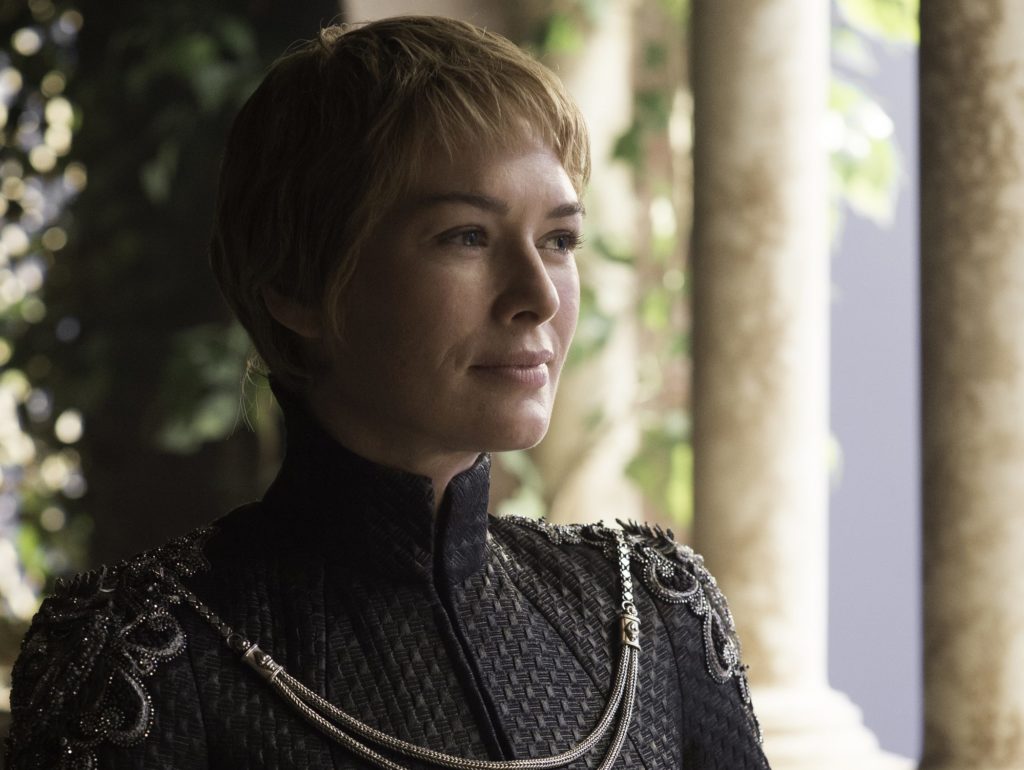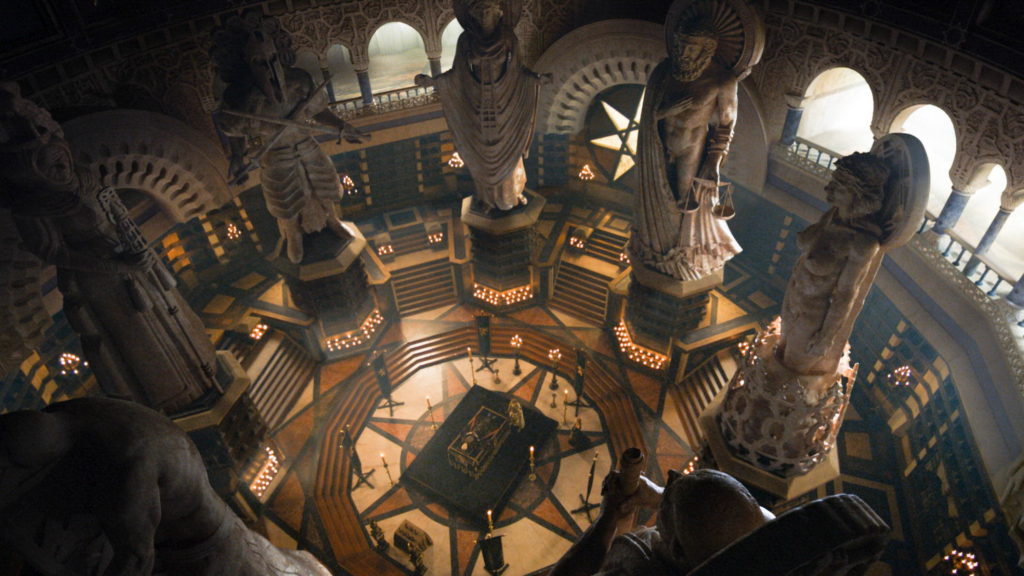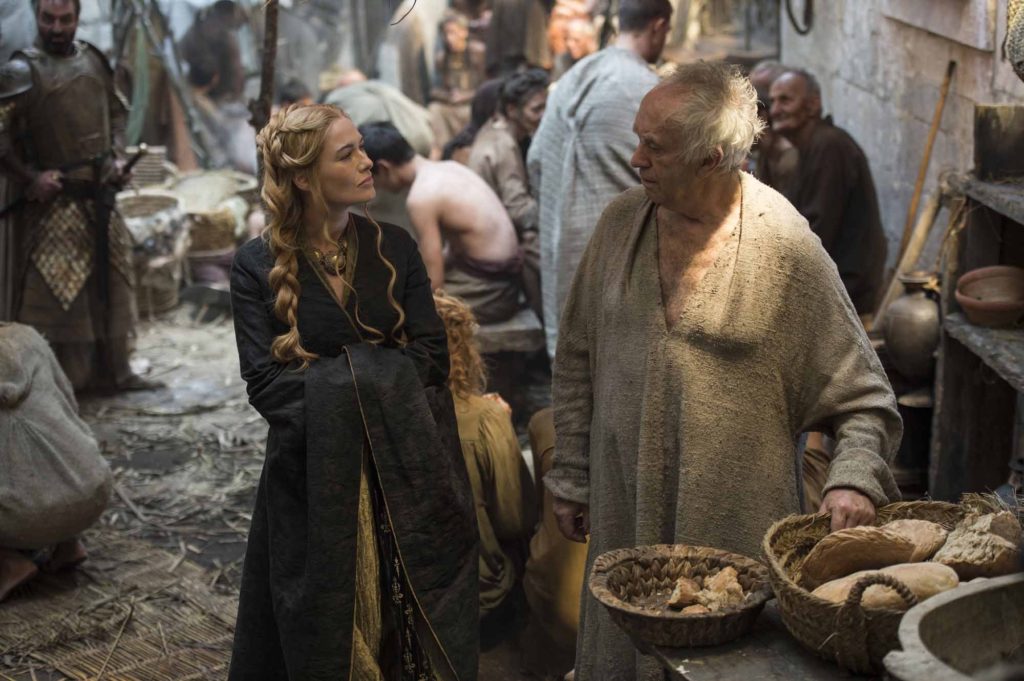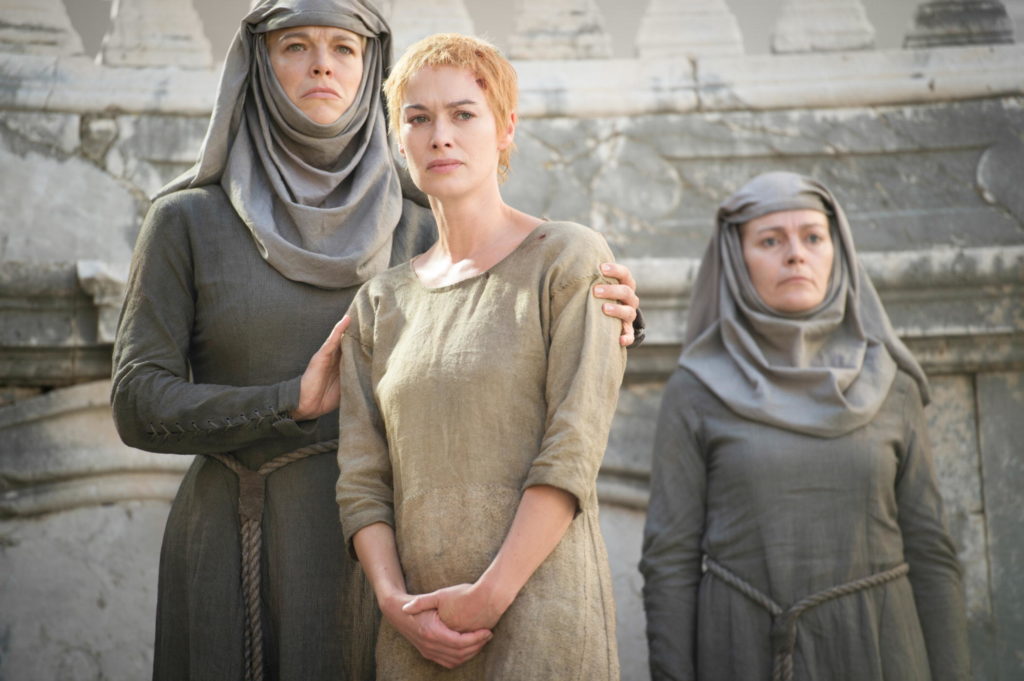Valar Morghulis,
The seats of power within the world of Game Of Thrones are thoroughly dominated by men. Six out of the seven kingdoms on the continent of Westeros operate under a strict male primogeniture system. In such a system, the eldest male child is the one who inherits the family’s seat of power. One can imagine that such a system portends far too much risk, and indeed, glances at just the medieval European era alone proves how such a system inherently eschews a consistency of sense and stability. Dorne is the only aberration from this patriarchal primogeniture, its uniqueness borne out of it being founded by the warrior queen Nymeria.
Systems of power do not exist in vacuums and they often rely upon a quid pro quo mechanism in order to continue to operate. Patriarchal primogeniture in that regard is no different. It is first and foremost a result of strictly defined, binary gender norms that exist to reinforce a rigid social hierarchy between men and women. Yet as much as existing social norms are responsible for the creation and the sustainment of patriarchal primogeniture, the beneficiaries of the system also reinforce them to ensure the longevity of their power.
Patriarchal primogeniture is nevertheless a singular example of the way that systems of power in Westeros are dominated by men. Game Of Thrones is ubiquitous with examples of male-dominated institutions and hierarchies. The Faith of the Seven is dominated by male priests and during the rise of the High Sparrow (Jonathan Pryce) that male domination turns into something particularly ugly. The Red God is represented most ubiquitously by women but the construction of that religion is founded upon the all-knowing savior-hood of a male figure. The Maesters of the Oldtown, the keepers of all Westerosi knowledge, simply refuse to even allow women to enter the hallowed halls of their library.
A dominant theme of Game Of Thrones is the examination of the various ways in women traverse these patriarchal halls of power and what those pathways look like. Just as importantly, the theme delves into what those pathways tell the audience about the society that seems to exist so far away but is unfortunately not as different as we would like it to be. The fiery conflagration that destroys the Sept of Baelor in “The Winds Of Winter” is a key case study in looking at patriarchal systems and how they shaped and drove the decisions Margaery Tyrell (Natalie Dormer) and Cersei Lannister (Lena Headey) made when the latter decided to bring the Sparrows to power.
Westerosi organized religions are a patriarchal construction and as the predominant faith for approximately half of the continent, the Faith of the Seven is intimately tied to that construction. Faithful devotees pray to the Mother on matters of pregnancy and childbirth. They pray to the Crone for wisdom and guidance. They pray to the Maiden to keep their young daughters safe. But the priests and decision-makers of the Seven are all men and that orthodoxy, while never lost in the religion’s history, is reinforced in a markedly different way when the Sparrows are brought to power.
Cersei’s entire life has been shaped by patriarchal institutions and critically by individuals (mostly men) who enforce those institutions’s aims and processes. Her father Tywin Lannister (Charles Dance) inspired the sort of fear and respect she so desperately desired for herself but could not garner on account of her gender. Her brother Jaime (Nikolaj Coster-Waldau) received all of that attention and respect she wanted on account of him being the presumed heir to Casterly Rock. Her disastrous relationship with Robert (Mark Addy) irrefutably shaped her perceptions of what it means to be a man in a position of authority and it only helped cement her resentment at being born a woman.
With the assassination of Tywin, the opportunity opened up for Cersei to finally grab the reins of power and prove to her father that she was in fact his worthy heir. And as far as she was concerned, the real opponents lying in her way was House Tyrell, whose rose façade crumbled in front of her to just show an abundance of thorns. If she could diminish the influence of her rivals, the pathway towards consolidating her hold over the power that emanated from King’s Landing. In her desire to diminish the influence of House Tyrell in King’s Landing, she strikes a fateful bargain with a seemingly humble man of the gods.
Cersei’s calculus, or lack thereof, was quite simple in theory. She would operate the tools of power as her father would have and in this case the tool of power would be able to provide Cersei the resources of the Faith of the Seven. When she meets this so-called High Sparrow, she sees an impoverished peasant feeding the poor and mumbling on about the inequities of Westeros. She sees an easily manipulable tool and as far as she was concerned, the High Sparrow would be eternally grateful that she rose his position and if he was truly committed to serving the poor, then she could just throw gold his way. As schemes in Game Of Thrones often go, this one falls apart and backfires spectacularly.
The initial mistake was her arming of the Faith Militant. Analogous to the existence of the papal armies that was formally disbanded in 1870, the Faith Militant served as the military branch of the Faith of the Seven. Relationships of power between governmental and religious institutions have a tumultuous history and this is no different. During the reign of King Maegor I (also known as Maegor the Cruel) of the Targaryen Dynasty, the Faith Militant was disbanded and removed as a threat to the monarchical power. The writing of Cersei’s decision to do this is sharper in the books as there is a financial component attached but even in the show, the reasons for doing so are obvious. The Faith Militant would be a more forceful, violent arm of her power schemes and if the Tyrell army in any capacity moved against them as Cersei would expect, then it wouldn’t be precious Lannister soldiers falling to the soldiers of the rose.
At first, Cersei’s plan seems to be going swimmingly well. Loras (Finn Jones) is imprisoned for homosexuality and Margaery (Natalie Dormer) is imprisoned for lying to protect him. When Cersei visits Margaery in prison, she is gleefully ensconced within that aura of jubilation and seeing her rival queen dirty and seemingly defeated does nothing to temper that aura. A few minutes later, however, her eyes widen in shock as she realizes that the man to whom she had handed weapons and authority to use for her is turning them on her instead. Cersei arguably tried the same strategy that she did with Joffrey, of handing men power because the patriarchal systems of power demanded that she do so.
The patriarchal paradigm of the High Sparrow’s political positions demanded that Cersei’s power be publicly denounced. Critically, however, that denunciation needed to happen in a way where the onus of the behavior fell squarely upon her shoulders. The Walk of Shame was designed to be a public spectacle primarily to remove the fear that Cersei has inspired as Queen Regent, for seeing her in such a vulnerable state removes the veneer of impenetrability she had had. The sexual and gender aspects are kept critically in mind to add further connotations to stripping away Cersei’s power and adding onto her vulnerabilities.
The trial of Cersei Lannister is arguably an allegorical trial about the patriarchal power systems the High Sparrow embodies. It is a farce of justice where the outcome is determined, regardless of the truth about the accused (in this case, Cersei was quite guilty of committing the accused deeds). Cersei is well aware of what lies ahead of her at that trial, even if the specific punishments are unknown to her. She knows that at that juncture, there simply is no turning back and she frankly no longer cares about her place within the patriarchal paradigms of Westeros. She decides to stop trying to play the game of chess through men. Instead, she detonates the chessboard itself.
Valar Dohaeris,
Akash Of the Andals




Boy you nailed it. More than any other lady Cersie resented men ruling her fate. She was never a sweetie but the WoS may be what made her a callus mass murderer. That walk is also what made her understandable in the book. And it’s sure as hell was what started her on the road to mad queeness. And losing her last kid…which was her own damm fault. Thx for this look in at show’s most conflicted gal.
Love your breakdown of the male dominated system even Ned who loved his both his daughters planned that Arya would marry and become a lady of a noble house, even if he’d had the time to finally realised that as Arya said it wasn’t her.
Was it Tywin who said Cersei wasn’t as clever as she thought she was. As her story progress we started to understand her reasons of why she took the actions she did, she wanted not to be dominated by the males of Westeros. So she got Lancel to murder of her husband, then her rejection of Tywin plans for her to reremarry, the plans she had to use the Faith of Seven and how she underestimated the High Sparrow intensions and the power of Margery over Tonmon.
But she did succeed in gaining power, and now that the Maggie the Frog prophecy came true the gloves came off she had nothing to control her, she is the Queen. With Jamie gone no children left, Cersei is on her own and I think in greater danger from Euron or anyother Westeros Lord who may think he has a chance at the Iron Throne.
I do have a question, do you think that the blowing up of the Sept would have been more acceptable if she was a man? Like nobody liked that Ageon during his conquest won the battle of the Field of Fire.
Cersei Lannister is her own worse enemy she will not listen to advise, and now there only her ally Euron, just wondering who is more out of control Cersei or Euron?
Great essay. I realize it isn’t cool to be one of Team Cersei, however the girl’s got it going on. Cersei is the shadow side of Dany. Dany was being groomed for an incestuous relationship with her slimey brother; Cersei most likely seduced Jaime just because she could. Cersei became the pawn of a religious movement and its leader who attempted to destroy her; Dany uses her magic and her dragons to become the leader of her own quasi-sect and made an alliances with the followers of the Red God. Cersei’s concept of honor is take whatever I can get; Dany ostensibly wants to break “the wheel”.
Dany and Cersei represent two approaches to women taking power in the face of withering patriarchal dominance. Dany wants to learn from patriarchy and reorder it into something that is beneficial for an entire culture. Cersei just wants to be one of the boys. So far she’s seems to be winning.
I’ve got to disagree just slightly. Going by the books, both Cersei and Jaime were equally fond of “enjoying” one another, even as children (trying to copy what the animals in the fields did). As they matured into adults, Cersei would have quickly realized that Jaime got more out of the experience than she did and was therefore more dependent on her to provide it. This made Jaime ripe for emotional manipulation, and she began taking advantage of him. This was probably her first chance to practice seduction, and soon, it became her major weapon.
As Olenna said to Jaime
“.. but your sister… has done things..
I was incapable of imagining….”
MCH,
Blowing up the Sept is comparable to the Red Wedding. Walder Frey and Cercei seem pretty much equally hated, so I don’t think there’s a gender bias in the reaction.
Cercei’s action is the more understandable and forgiveable, because it was literally her only option. If she hadn’t taken it she would have almost certainly died. Flipping the table is often the only recourse a woman has in Westeros – just ask Daenerys and Arya. However, it should be pointed out, Cercei’s own foreseeable stupidity created her dilemma to begin with.
Riverhawk2055,
I think Dany represents the end of the ‘Cersei argument’, because she is everything that Cersei is but ‘better’.
She takes all the qualities that make Cersei a great female character in this medieval world, but her life is a demonstration that you can be better.
Dany reveals that Cersei is just a bitch, because she’s had everything that Cersei had thrown at her and worse, and she has many of Cersei’s strengths, but is just a better person and a potentially better ruler. She proves that Cersei never had to be Cersei.
It would have been. Fans never thought that Stannis and Tywin were mad even though they did worse things than Cersei.
I find amusing that for a patriarchal society all persons of power are women.
– The iron throne is in the hands of Cercei (who in the books is an idiot, but in the show is prob my fav character right now). Jaime is naive.
– Olenna had the Reach, her son was a fool. Her ‘heir’ was Margaery, Loras was naive.
– Both Joffrey and Tommen were played as if in strings by Margaery.
– Dorne belonged to Ellaria and her SS ninja command (why the lords would follow her, being just a concubine??)
– The Greyjoys (at least a faction) were led by Yara. The other faction are fools who follow a kin-slayer that talks about dic*s.
– Sansa is the lady of Winterfell, and in all functional aspects the true Queen in the North.
– Dany is the personification of awesomeness. Jon is now her puppy.
– Arya is an uber ninja-asssassin.
– The greatest warrior is Brienne (in the show she defeats the hound)
Did the show carried a bit too far the feminist theme? The culture of this fantasy world is supposed to be patriarchal, so this stories are a bit incongruous with that setting.
I had not heard primogeniture previously described as a source of political instability, rather the opposite. It designates in advance who the next ruler will be, reducing the number of people who can make claims (although one can allege an opponent is a bastard pretender to the throne). Ancient Egypt is perhaps the longest-lasting most stable civilization we know of, and their rule of inheritance as far as I can tell went to the eldest son.
Em,
Hadn’t thought to compare the Red Wedding with the blowing up of the Sept by Cersei.
Both where political acts of murder, but Walter Frey at least was not about to be put on trial like Cersei with maybe I think a possibility of Cersei being beheaded like Ned was or imprisoned with the prison door key being thrown away.
I don’t think there’s actually that much similar between the Red Wedding and the Greenfire Sept Trial, outside of the number of victims. Walder Frey may actually have won in the victim count, but those he killed were Robb, his family, and his armies. Cersei took out a huge number of truly ‘innocent people.
Also, although Walder Frey was not at that moment on trial, it’s likely that he’s been informed by Tywin Lannister that he’s in rebellion against the legitimate King on the Iron Throne, Joffrey “Baratheon”, and unless he proves his loyalty to Joffrey by getting rid of Robb, he can expect punishment – cue “the Reynes of Castamere”, which you may have noticed, Walder had playing when the killing began.
This would mean Walder was playing for the continued survival of each and every Frey throughout all of Westeros. Cersei just had her own skin/power at stake and her vanity. So really, Greenfire Sept was much more horrific than the Red Wedding. And it removed a major and historic building, with its historical records and graves of the honored Targaryen dead, AND the various septons, septas, and accolytes from King’s Landing as well.
Agreed. That’s why Dany has to be the “queen” to overthrow her. Some people say that’s too predictable, but that’s only because it make so much sense.
This is a thoughtful piece, though I think by analyzing Westeros through a feminist lens, there’s a tendency to see patriarchy as a primal cause even where it’s really not the driving force in the narrative. In particular, I take issue with analyzing the High Sparrow’s actions against Cersei as being driven by a desire to reassert male control. His overriding desire was to humiliate (though he would probably say “humble”) the nobility writ large, not women. Remember that the previous High Septon was forced to do his own naked walk. The High Sparrow wanted to subjugate the wealthy to the masses and the throne to the Faith. If Cersei had been a weak, easily manipulated monarch, the High Sparrow probably would have been thrilled to leave her in place as Queen Regent. Instead, Tommen proved to be the gullible fool he needed on the Iron Throne.